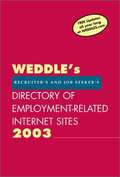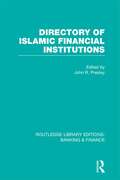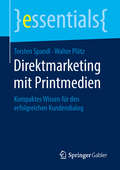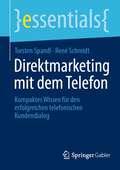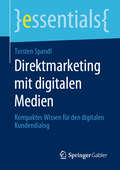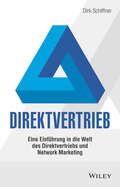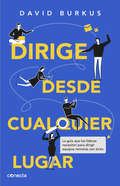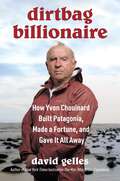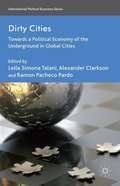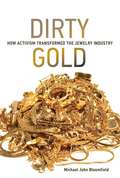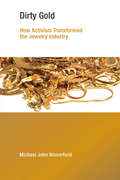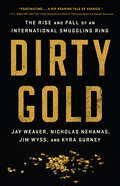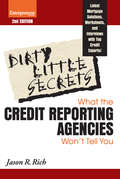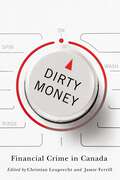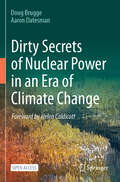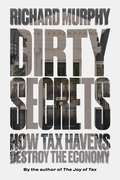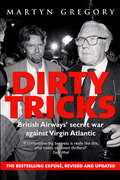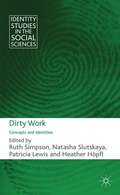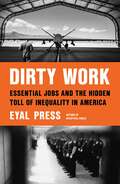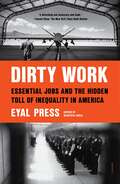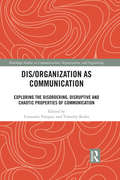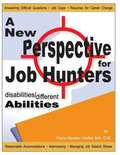- Table View
- List View
Directory of Employment-Related Internet Sites
by Peter D. WeddleThere are over 40,000 employment-related sites currently operating on the Internet. These job boards, resume databanks and career portals can give you a powerful advantage in the search for talent and in finding a new or better job. How can you take best advantage of these resources? Whether you're a job seeker or career activist, a recruiter or HR professional, the key to success is smart shopping-picking the right site for your particular situation and location. But to shop smart online, you need to know your options. And that's where WEDDLE's 2003 Directory of Employment-Related Internet Sites comes in! It is the most comprehensive and up-to-date listing of these sites in print, and it's been completely updated for 2003. In WEDDLE's Directory, you'll find over 6,000 sites organized in three categories: * Career field (e.g., sales and marketing, finance and accounting, human resources, engineering). * Industry (e.g., healthcare, banking, construction, insurance). * Location (including every state in the Union and more than 25 countries). All you have to do is find the category of interest to you, and "let your mouse do the clicking!" Each site is listed by name and its address (also called its Universal Resource Locator or URL) on the Internet. That way, you can find just the right sites for you, quickly and easily.
Directory of Islamic Financial Institutions (Routledge Library Editions: Banking & Finance)
by John R. PresleyWhen originally published this was the first reference book to address itself to Islamic banking and finance and it offers comprehensive information on all major institutions which have commercial or banking interests in this field. It includes analysis of the principles behind interest-free banking and indicates its relationship with financial institutions in both Islamic countries and Western ones. It also lists the laws governing interest-free banking in countries where it is extensively in operation and provides essential information for all international financial institutions. The Directory lists all banks and financial institutions by country, giving details of their specific role and areas of operation.
Direktmarketing mit Printmedien: Kompaktes Wissen für den erfolgreichen Kundendialog (essentials)
by Torsten Spandl Walter PlötzDieses essential zeigt, wie Direktmarketing gekonnt und gewinnbringend eingesetzt wird. Direktmarketing ist eines der wichtigsten Marketing-Instrumente für B2C- und B2B-Kommunikation. Es stellt den 1:1-Kontakt her und erreicht Kunden individuell. Gutes Direktmarketing findet viele Kontaktanlässe, um Kunden mehrfach pro Jahr zu erreichen und eine gute Datenqualität sorgt für steigende Erfolgsquoten und erfolgreiche Kampagnen. In diesem Band finden sich Anlässe und Ideen für den Redaktionsplan des Direktmarketings, die wichtigsten Regeln für den Kundendialog, Kreativitätsanregungen für die Direktmarketing-Aktion und die praktische Umsetzung von Direktmarketing mit Printmedien.
Direktmarketing mit dem Telefon: Kompaktes Wissen für den erfolgreichen telefonischen Kundendialog (essentials)
by Torsten Spandl René SchmidtDas Telefon besitzt eine besondere Bedeutung für erfolgreiche Direkt- und Dialogmarketingaktionen. Es ist die direkteste Kommunikationsform, die Vertrieb und Verkauf zur Verfügung steht.Wie setzt man das Telefon richtig ein? Welche Arten von Telefonaten gibt es? Wie plant man erfolgreiche telefonische Direktmarketingaktionen? Und was sind die besten Tipps und Tricks beim Telefonieren? Diese Themen behandelt das vorliegende essential zum erfolgreichen telefonischen Direktmarketing. Strukturiert und praktisch, direkt umsetzbar und gut zu planen. Mit diesem praxisnahen Buch sind Sie für die nächste telefonische Direktmarketing-Aktion optimal vorbereitet.
Direktmarketing mit digitalen Medien: Kompaktes Wissen für den digitalen Kundendialog (essentials)
by Torsten SpandlDieses essential zeigt praxisnah, wie sich Direktmarketing durch digitale Medien schnell und erfolgreich umsetzen lässt. Die E-Mail ist als Klassiker immer noch sehr relevant, mal für gezielte Nachrichten mit geplanten Ansprache-Sequenzen, mal als Newsletter an ausgewählte Kundengruppen. Auch die sozialen Netzwerke sind ideale Dialogmarketing-Instrumente, die erfolgreiche Unternehmen heute nutzen. Das essential stellt die wichtigsten Grundsätze zusammen und versorgt Sie mit vielen Tipps und Tricks, wie Direkt- und Dialogmarketing besser und erfolgreicher wird.
Direktorenwahlen – ein Vertrauensvotum: Einfluss von Gesichtsmerkmalen auf die Wahl US-amerikanischer Board-Direktoren
by Felix W. SchwederEin Gesicht vermittelt in nur 34 ms konsistent und relativ reliabel nicht nur objektive, sondern auch subjektive Personenmerkmale. Valide oder nicht – dieser unbewusst generierte Code repräsentierter personeller Eigenschaften ist äußerst löschungsresistent. In der vorliegenden Arbeit wird untersucht, ob und in welchem Ausmaß attraktive, kompetente, vertrauenswürdige oder sympathische Gesichtsausdrücke US-amerikanischer Board-Direktoren für deren Wahl relevant sind. Die Schätzungen der linearen Paneldaten basieren auf großen Stichproben und liefern repräsentative Ergebnisse. Die breite Auswahl potenzieller Einflussfaktoren auf das Wahlverhalten der Aktionäre schließt wesentliche verzerrende Einflüsse aus. Erstmals im Kontext der Untersuchung von Aktionärswahlverhalten wird zur Kontrolle von Stimmenzurückhaltungen/ Gegenstimmen ein in der Forschung zur Gesichtswahrnehmung etabliertes objektives Maß verwendet - das Facial Width-to-Height-Ratio.
Direktvertrieb: Eine Einführung in die Welt des Direktvertriebs und Network Marketing
by Dirk SchiffnerDas Buch von Dirk Schiffner schließt eine Lücke und erklärt den Direktvertrieb in seiner Gesamtheit. Es soll das Standardwerk für den Direktvertrieb werden und zum Verstehen der Systeme und Arbeitsweisen dieses Vertriebskanals beitragen. Sehr strukturiert wird das "Warum", "Was", "Wer" und "Wie" behandelt. Darüber hinaus werden verschiedene - zum Teil vom Autor selbst entwickelte - Modelle vorgestellt und erklärt, wie zum Beispiel seine DS Salesforce Matrix. Schiffner beschreibt die Sales-Systeme und die spezifischen Marketing Ps in diesem Feld. Der Autor bringt seine Expertise aus 18 Jahren Erfahrung im Direktvertrieb in dieses Buch ein. Damit verfügt er über einen einzigartigen Erfahrungsschatz in dieser Branche, an dem er nun die Leser teilhaben lässt.
Dirige desde cualquier lugar
by David BurkusEstamos entrando en una nueva era de trabajo remoto, pero ¿cómo pueden los líderes asegurarse de que su negocio funcione como antes cuando la manera de trabajar se ha vuelto tan diferente? Los más recientes estudios demuestran que las personas son más productivas y comprometidas cuando tienen la libertad de trabajar desde cualquier lugar, lo que significa que los líderes deben desarrollar habilidades de liderazgo en todo terreno. David Burkus ha realizado una profunda investigación sobre equipos virtuales y casos de estudio de compañías que no sólo han sobrevivido, sino que han triunfado en el trabajo a distancia. Como resultado, ha desarrollado una guía para para dirigir equipos remotos que ayudará a los líderes a enfrentar los retos del nuevo panorama laboral: desde contratar e introducir a nuevos miembros a tu equipo, crear una cultura remota y asegurar la productividad, hasta comunicar rápidamente, retener a tus colaboradores más valiosos y lograr que tus colegas alcancen el equilibrio entre la vida personal y el trabajo. En Dirige desde cualquier lugar encontrarás todo lo que necesitas para triunfar como líder remoto, lo cual será imprescindible de ahora en adelante para todos los que estén al frente de un equipo.
Dirk Nowitzki: Changing the Game
by Boris Groysberg Sascha L. Schmidt Evan M S HechtNBA Superstar Dirk Nowitzki was unsure whether the 2018-19 season would be his last as an NBA player. He had not faced such uncertainty since 1998, when he had navigated a difficult decision regarding the timing of his move to the NBA. He also did not know what he would do when he ultimately retired, as playing basketball was all he had known for his entire adult life. His foundation in Dallas and in Germany provided grant money and strategic support to youth programs; he could become more directly involved in the foundation's work. The Dallas Mavericks had made it clear that they would be open to Nowitzki transitioning to a role as some type of executive or coach, helping the Mavericks make decisions and/or develop their young players. Nowitzki was also intrigued by the idea of becoming an independent mentor for young, amateur players; after all, his mentor, Holger Geschwindner, had been instrumental in his development, and he liked working with young people. Keeping his various options in mind, how should Nowitzki plan for the next phase of his life and career?
Dirtbag Billionaire: How Yvon Chouinard Built Patagonia, Made a Fortune, and Gave It All Away
by David GellesNew York Times reporter and bestselling author David Gelles reveals how Patagonia became a global leader in doing well by doing good and how other companies are adopting its principles.This is the inside story of one of the most extraordinary brands in the corporate world, the rare company that is driven by environmental activism instead of cutthroat capitalism. Founded in 1973, Patagonia has grown into a wildly popular producer of jackets, hats, and fleece vests, with a cultlike following among hardcore alpinists and Wall Street traders alike, posting sales of more than $1 billion a year. But it&’s not just the clothes that make Patagonia unique. For decades, the company has distinguished itself as a singular beacon for socially responsible business, the rare company that can legitimately claim to be doing its damnedest to make the world a better place, while also making a profit. From its early efforts to take exemplary care of its employees, to its extensive work trying to clean up its supply chain, to its controversial activism, Patagonia has set itself apart from its peers with one unorthodox decision after another, proving that there is another way to do capitalism. At the heart of the story is Patagonia&’s founder, the legendary rock climber Yvon Chouinard. A perennial outsider who forged one of the most impressive resumes in the outdoor world, Chouinard also established himself as a pivotal figure in the history of American business. Guided by his anti-authoritarian streak and his unwavering commitment to preserving the natural world, Patagonia came to exert a powerful influence on other companies, paving the way for a new era of social and environmental responsibility. He started out as a dirtbag—a term affectionately bestowed on poor, itinerant outdoorsmen so uninterested in material possessions they are happy to sleep in the dirt—and he became a billionaire. Chouinard also proved that there was another way to be a philanthropist. In the twilight of his career, he gave away Patagonia, renouncing his wealth and committing all its future profits to fighting the climate crisis. Drawing on exclusive access to Chouinard and the Patagonia team, Dirtbag Billionaire offers new insights into the key moments that informed their priorities, shaped the company, and sent ripples across the corporate world.
Dirty Cities
by Alexander Clarkson Leila Simona Talani Ramon Pacheco PardoOver the last three decades, the rapid growth of transport and telecommunications systems and the expansion of transnational diasporas have intensified links between the urban spaces of Europe, Africa, the Middle East and Southeast Asia. Increasing global mobility has fostered the development of 'informal' trading networks in which diaspora communities play a central role. As a consequence, the shadow economies of societies with vastly different levels of prosperity have begun to come into contact with one another. While the economic consequences of diaspora trading networks have been extensively explored over the past few decades, the impact of globalization on the economic underground has received much less attention. This volume elaborates on the definition of globalization, on its impact on illegal and illicit activities, and on the role of the 'Global City' as the intersection between the local and the global which allows for the empowerment of generally marginalized actors often through technological progress. The contributors explore the dark side of globalization, more specifically, the relations between globalization and the new dynamics of legal/illegal practices in urban settings of global cities.
Dirty Gold: How Activism Transformed the Jewelry Industry
by Michael John BloomfieldGold mining can be a dirty business. It creates immense amounts of toxic materials that are difficult to dispose of. Mines are often developed without community consent, and working conditions for miners can be poor. Income from gold has funded wars. And consumers buy wedding rings and gold chains not knowing about any of this. In Dirty Gold, Michael Bloomfield shows what happened when Earthworks, a small Washington-based NGO, launched a campaign for ethically sourced gold in the consumer jewelry market, targeting Tiffany and other major firms. The unfolding of the campaign and its effect on the jewelry industry offer a lesson in the growing influence of business in global environmental politics. Earthworks planned a "shame" campaign, aimed at the companies' brands and reputations, betting that firms like Tiffany would not want to be associated with pollution, violence, and exploitation. As it happened, Tiffany contacted Earthworks before they could launch the campaign; the company was already looking for partners in finding ethically sourced gold.Bloomfield examines the responses of three companies to "No Dirty Gold" activism: Tiffany, Wal-Mart, and Brilliant Earth, a small company selling ethical jewelry. He finds they offer a case study in how firms respond to activist pressure and what happens when businesses participate in such private governance schemes as the "Golden Rules" and the "Conflict-Free Gold Standard." Taking a firm-level view, Bloomfield examines the different opportunities for and constraints on corporate political mobilization within the industry.
Dirty Gold: How Activism Transformed the Jewelry Industry (Earth System Governance)
by Michael John BloomfieldThe response from the jewelry industry to a campaign for ethically sourced gold as a case study in the power of business in global environmental politics.Gold mining can be a dirty business. It creates immense amounts of toxic materials that are difficult to dispose of. Mines are often developed without community consent, and working conditions for miners can be poor. Income from gold has funded wars. And consumers buy wedding rings and gold chains not knowing about any of this. In Dirty Gold, Michael Bloomfield shows what happened when Earthworks, a small Washington-based NGO, launched a campaign for ethically sourced gold in the consumer jewelry market, targeting Tiffany and other major firms. The unfolding of the campaign and its effect on the jewelry industry offer a lesson in the growing influence of business in global environmental politics. Earthworks planned a “shame” campaign, aimed at the companies' brands and reputations, betting that firms like Tiffany would not want to be associated with pollution, violence, and exploitation. As it happened, Tiffany contacted Earthworks before they could launch the campaign; the company was already looking for partners in finding ethically sourced gold.Bloomfield examines the responses of three companies to “No Dirty Gold” activism: Tiffany, Wal-Mart, and Brilliant Earth, a small company selling ethical jewelry. He finds they offer a case study in how firms respond to activist pressure and what happens when businesses participate in such private governance schemes as the “Golden Rules” and the “Conflict-Free Gold Standard.” Taking a firm-level view, Bloomfield examines the different opportunities for and constraints on corporate political mobilization within the industry.
Dirty Gold: The Rise and Fall of an International Smuggling Ring
by Nicholas Nehamas Jay Weaver Jim Wyss Kyra GurneyThe explosive story of the illegal gold trade from South America, and the three Miami businessmen who got rich on itIn March of 2017, a team of FBI agents arrested Juan Granda, Samer Barrage, and Renato Rodriguez, or as they called themselves, "the three amigos." The trio--first identified publicly by the authors of this book-- had built a $3.6 billion dollar business in metals trading, mostly illegal Peruvian gold.Their arrests and subsequent prosecution laid bare more than a corrupt finance firm, though. Instead, Dirty Gold lifts the veil on an illegal international business that is five times as lucrative as trafficking cocaine, and arguably more dangerous.As the award-winning team of Miami Herald reporters show, illegal gold mines have become a haven for Latin American drug money. The gold is then sold to metals traders, and ultimately to Americans who want it in their jewelry, smartphones, and investment portfolios. By following the trail of these three traders, Dirty Gold leads us into a criminal underworld that has never before been in full view.
Dirty Hands: When Managers Are Forced to Choose Between Right and Right
by Joseph L. Badaracco Jr.Positions of power carry complicated responsibilities. On some occasions, these responsibilities conflict with each other. At other times, they conflict with a manager's personal values. All of these responsibilities, personal and professional, have strong moral claims, but often there is no way for a manager to meet every claim. These are not the ethical issues of right and wrong that we learn about as children. They are conflicts of right versus right. The right-versus-right choices that managers are forced to make become defining moments, and this chapter presents some important questions for thoughtful managers to ask themselves: Do you think you can govern innocently? How do you think about defining moments? How do you resolve them in ways you can live with? This chapter is excerpted from "Defining Moments: When Managers Must Choose between Right and Right."
Dirty Little Secrets
by Jason R. RichWhat the credit bureaus don't tell you can cost you thousands. Jason Rich unearths these dirty little secrets in this tell-all expose' aimed at immediately improving your credit report. Whether you have credit problems, are trying to establish credit or want to improve your credit score, this previously undisclosed advice can help you save hundreds, perhaps thousands of dollars every month.
Dirty Money: Financial Crime in Canada
by Christian Leuprecht and Jamie FerrillFinancial crime in Canada remains a mystery: omnipresent, but we know little about its operation. Transactions are cloaked with apparent legality, which makes tracking criminal activity through economic or financial statistics a complex undertaking.This distinctive volume aims to stem in-, out-, and through-flows of vast sums of dirty money by enhancing Canada’s capacity to detect, disrupt, deter, investigate, and prosecute domestic financial criminals and transnational organized criminal organizations. It brings together leading scholars and practitioners from the public and private sectors to identify and explore deficiencies in federal and provincial policy, regulation, legislation, politics, institutions, and enforcement, as well as the international financial crime regime. Together contributors pinpoint weaknesses that have turned the Canadian federation into a destination of choice for global financial crime, where its perpetrators can operate with impunity.Dirty Money reveals how globalization and technology have spun an extensive web of clandestine processes that disguises how financial criminals operate, the channels they use, and how they suborn banks and institutions. In the process, the extent of financial crime in Canada and its corrosive effects on communities, democratic institutions, and prosperity becomes apparent.Contributors: Sanaa Ahmed, John Cassara, Garry Clement, Arthur J. Cockfield, Caroline Dugas, Jamie Ferrill, Cameron Field, Michelle Gallant, Peter German, Rhianna Hamilton, Todd Hataley, Caitlyn Jenkins, Christian Leuprecht, David Maimon, Katarzyna (Kasia) Mcnaughton, Denis Meunier, Pierre-Luc Pomerleau, Stephen Schneider, Jeffrey Simser.
Dirty Secrets of Nuclear Power in an Era of Climate Change
by Doug Brugge Aaron DatesmanThis open access book provides a review of the serious limitations and drawbacks to nuclear power, and clearly conveys why nuclear power is a less than desirable option in terms of addressing climate change. It uses accessible and engaging language to help bring an understanding of the issues with nuclear power to a broader sector of the public, with the intention of appealing to non-scientists seeking knowledge on the disadvantages of nuclear power as a solution for climate change. The argument is made that while superficially appealing, nuclear power is too costly, fragile, and slow to implement, compared to alternative options such as wind and solar. “As this book shows, to nowadays hold on to Nuclear Energy, a risky and extremely expensive method of create power, just does not make sense any longer.” -- Prof. (em.) Andreas Nidecker, MD, retired academic radiologist, Basel, Switzerland “Datesman and Brugge present evidence that nuclear power is an insecure and unsecureable technology, inherently incompatible with humanity and democracy; it fuels nuclear weapons technology and possession; choosing it would damage our chances at mitigating the climate crisis.” -- Cindy Folkers, MS, Radiation & Health Specialist, Beyond Nuclear “Although the government, industrial, and scientific nexus say it is safe.…I can only think of one word in Navajo "Ina'adlo'" meaning manipulation by the power that be to say it is safe. My Navajo people are dying from the uranium exposure on their health and environment. Great account of information on studies that have taken place around the world to say uranium is not good.” – Esther Yazzie, Navajo Interpreter and knowledge holder on Navajo issues. “At a time when there is a call to triple the growth of nuclear power, Datesman and Brugge provide a timely and thorough examination of the dark-side of “romancing” the atom. With solid technical astuteness, they cover a wide field littered with unsolved and dangerous problems ranging from the poisoning of people and the environment to the failed economics, to the spread of nuclear weapons ….they point out how science and public trust have been corrupted by the lure of unfettered nuclear growth.” –Robert Alvarez, Associate Fellow at the Institute for Policy Studies in Washington, D.C.
Dirty Secrets: How Tax Havens Destroy the Economy
by Richard MurphyWhat happens when the rich are allowed to hide their money in tax havens, and what we should do about itThe Panama Papers were a reminder of how the superrich are allowed to hide their wealth from the rest of us. Dirty Secrets uncovers the extent of the corruption behind this crisis and shows what needs to be done in the face of this unregulated spread of rampant greed.Tax havens, we are often told, are part of the global architecture of capitalism, providing a freedom from regulation necessary to make markets work. In this book, leading authority Richard Murphy uncovers the truth behind this lie. The fact of the matter is that this increasingly popular practice threatens the foundations of democracy, sowing mistrust and creating a regime based upon opacity.As Murphy shows, how we manage our economy is a political decision, and one that can be changed. Dirty Secrets proposes ways to regulate tax havens and what the world might look like without them.
Dirty Tricks: British Airways' Secret War Against Virgin Atlantic
by Martyn GregoryRichard Branson's Virgin Atlantic was valued at over £1.2 billion when he sold a 49% stake to Singapore Airlines in 1999. This was an extraordinary achievement for an airline that began life in 1984 with one plane. Virgin Atlantic became one of the world's top airlines only after surviving an incredible dirty tricks campaign by British Airways. Award Winning investigative jounalist Martyn Gregory exposed BA's secret war, and he reveals the full story in Dirty Tricks.
Dirty Work
by Ruth Simpson Natasha Slutskaya Patricia Lewis Heather H�pflThis book explores understandings and experiences of 'dirty work' - tasks or occupations that are seen as disgusting and degrading. It complicates the 'clean/dirty' divide in the context of organizations and work and illustrates some of the complex ways in which dirty work identities are managed.
Dirty Work: Essential Jobs and the Hidden Toll of Inequality in America
by Eyal PressDrone pilots who carry out targeted assassinations. Undocumented immigrants who man the "kill floors" of industrial slaughterhouses. Guards who patrol the wards of the United States' most violent and abusive prisons. In Dirty Work, Eyal Press offers a paradigm-shifting view of the moral landscape of contemporary America through the stories of people who perform society's most ethically troubling jobs. As Press shows, we are increasingly shielded and distanced from an array of morally questionable activities that other, less privileged people perform in our name. The COVID-19 pandemic has drawn unprecedented attention to essential workers, and to the health and safety risks to which workers in prisons and slaughterhouses are exposed. But Dirty Work examines a less familiar set of occupational hazards: psychological and emotional hardships such as stigma, shame, PTSD, and moral injury. These burdens fall disproportionately on low-income workers, undocumented immigrants, women, and people of color. Illuminating the moving, sometimes harrowing stories of the people doing society's dirty work, and incisively examining the structures of power and complicity that shape their lives, Press reveals fundamental truths about the moral dimensions of work and the hidden costs of inequality in America. EYAL PRESS is an author and a journalist based in New York. The recipient of a James Aronson Award for Social Justice Journalism, an Andrew Carnegie fellowship, a Cullman Center fellowship at the New York Public Library, and a Puffin Foundation fellowship at Type Media Center, he is a contributor to The New Yorker, The New York Times, and numerous other publications. He is the author of Beautiful Souls and Absolute Convictions.
Dirty Work: Essential Jobs and the Hidden Toll of Inequality in America
by Eyal PressA groundbreaking, urgent report from the front lines of "dirty work"—the work that society considers essential but morally compromised.Drone pilots who carry out targeted assassinations. Undocumented immigrants who man the “kill floors” of industrial slaughterhouses. Guards who patrol the wards of the United States’ most violent and abusive prisons. In Dirty Work, Eyal Press offers a paradigm-shifting view of the moral landscape of contemporary America through the stories of people who perform society’s most ethically troubling jobs. As Press shows, we are increasingly shielded and distanced from an array of morally questionable activities that other, less privileged people perform in our name.The COVID-19 pandemic has drawn unprecedented attention to essential workers, and to the health and safety risks to which workers in prisons and slaughterhouses are exposed. But Dirty Work examines a less familiar set of occupational hazards: psychological and emotional hardships such as stigma, shame, PTSD, and moral injury. These burdens fall disproportionately on low-income workers, undocumented immigrants, women, and people of color.Illuminating the moving, sometimes harrowing stories of the people doing society’s dirty work, and incisively examining the structures of power and complicity that shape their lives, Press reveals fundamental truths about the moral dimensions of work and the hidden costs of inequality in America.
Dis/organization as Communication: Exploring the Disordering, Disruptive and Chaotic Properties of Communication (Routledge Studies in Communication, Organization, and Organizing)
by Consuelo Vásquez Timothy KuhnThis book accounts for the transformation of organizations in a post-bureaucratic era by bringing a communicational lens to the ontological discussion on organization/disorganization, offering a conceptual and methodological toolbox for studying dis/organization as communication. Increasingly, scholars acknowledge that communication is constitutive of organization; because meaning is always indeterminate, communication also (and simultaneously) generates disorganization. The book synthesizes the major theoretical trends and empirical studies in communication that engage with dis/organization. Drawing on dialectics, relational ontologies, critical theory, systems theory, and affect thinking, the first part of the book offers communicational explanations of how dis/organization unfolds. The second part of the book grounds this theoretical reflection, providing empirical studies that mobilize diverse methodological and analytical frameworks (e.g., ethnography, situational, interactional and genre analysis) for studying the practices of dis/organization. Overall, the book exposes organizations (and organizing processes) as significantly messier, irrational (or a-rational), and paradoxical than scholars of organization typically think. It also offers readers the conceptual and methodological tools to understand these complex processes as communication. This book will be essential reading for scholars in organizational communication or management and organization studies, together with senior undergraduate and graduate students studying organizational communication, organizational discourse, discourse analysis (including rhetoric, semiotics, pragmatism, narratology) and courses in management studies. It will also be richly rewarding for organizational consultants, managers and executives.
Disabilities/Different Abilities
by Paula Reuben VieilletThis is a hands-on workbook which will help the job hunter who has a disability secure employment. Step by step, this manual guides the job hunter through the vocational process in an honest and positive manner so as to get results. It is designed for individual usage, or in conjunction with a trained professional. The first section, Getting to Know You, addresses self-esteem, personal values and job goal definition and includes motivational strategy. The second section, Facing Workplace Discrimination, reviews application and interviewing functions with a focus on eliminating discrimination in the hiring process. Typical concerns of job hunters are answered in a straightforward and informative manner. The third section, Ready, Set, Go, deals with feelings and concerns regarding returning to work and includes a handy reference guide of available resources for job hunters with disabilities.
